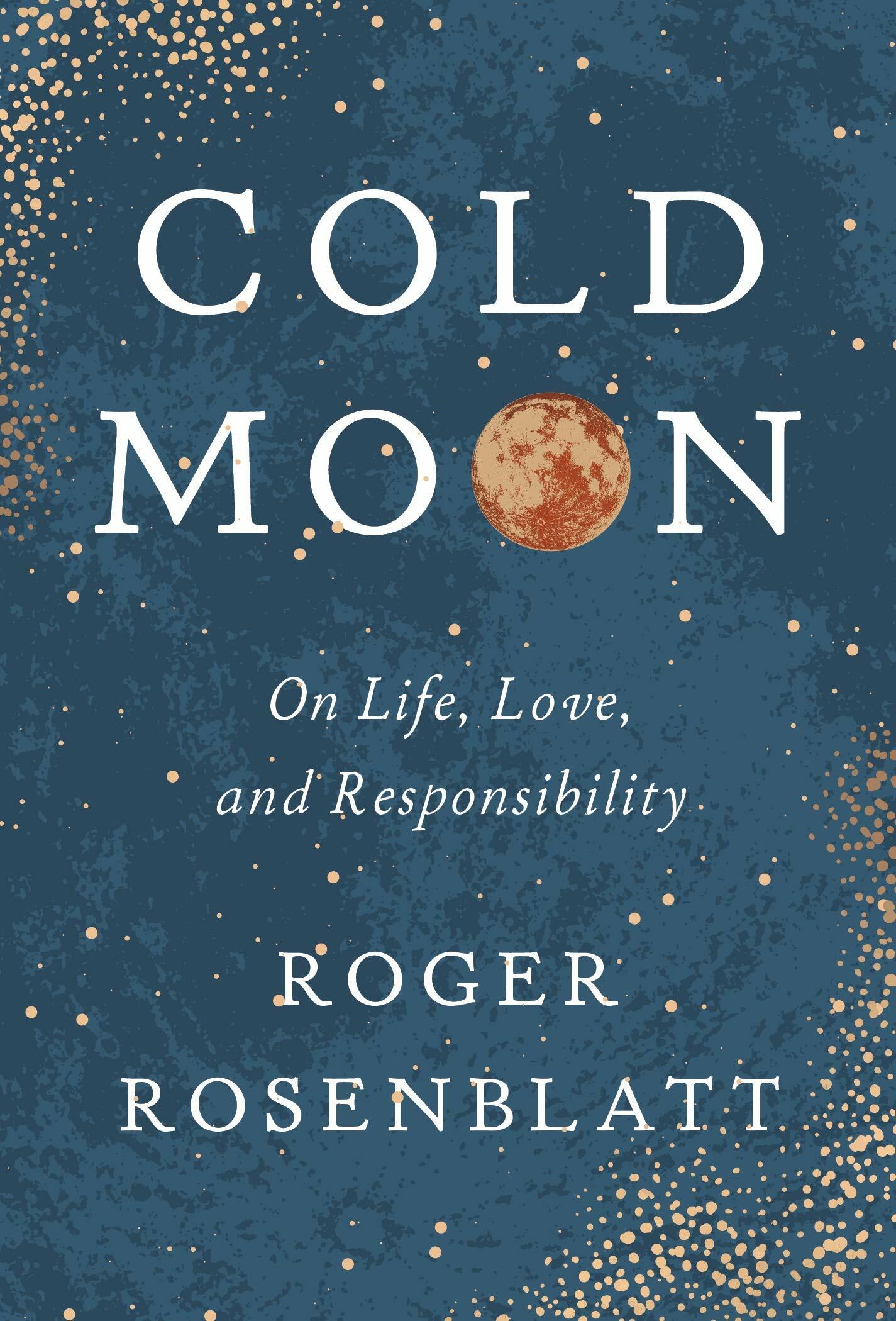
You might want to consider reading Roger Rosenblatt’s new collection of personal and philosophical musings “Cold Moon” shortly after 4 p.m. on December 29, when the full moon, also known as the cold moon, will appear and linger above the horizon in our area. And if you’ve read Rosenblatt’s previous work about the death of his 38-year-old daughter Dr. Amy Rosenblatt Solomon in 2007 you may remember that she died in December.
Her sudden death, due to an anomalous right coronary artery, struck the Rosenblatts with shock and anguish, mitigated only by Rosenblatt’s instinctive move to Maryland, where Amy had lived with her husband, also a doctor, and their three young children, to help look after the family. As “Cold Moon” shows, 15 years after the tragedy, Rosenblatt is still overcome with grief. It shadows all his writing and never more so than in this series of short, journal-like ruminations “On Life, Love, and Responsibility,” which is the subtitle of this handsome-looking small book of 98 pages.
The proximate occasion of “Cold Moon” is Rosenblatt’s turning 80 this year (he calls it “old age”), but his larger theme seems to be connecting past and present in a way that will somehow “redeem” loss at this time, the “winter solstice, the coming of my wintertime of life,” not to mention the pandemic, which is never mentioned but hovers over all. He wanders “from thought to thought,” invoking along with anecdotes from childhood snippets of poetry, philosophy, physics, nature, biology and travel. Wordsworth is a favorite poet, but though Rosenblatt doesn’t reference the magnificent 1807 Ode, “Intimations of Immortality from Recollections of Early Childhood,” he would likely subscribe to its last line about finding strength in what’s left behind after grief, his “weathered mind” like Wordsworth’s “philosophic mind,” acknowledging “thoughts that lie too deep for tears” (Wordsworth, who lost two children, lived to 80).
Tears, though, open the book: “Wipe the tears from your face, and see the boulevard of light the Moon has cast on the black water.” The line is repeated at the start of the second paragraph, as Rosenblatt segues to recalling being on a beach with his young grandsons, one of whom says that he “loves life.” Those two words inform the whole collection, at times in humorous contexts, at other times as a heartfelt mantra, the author continually in conversation with himself.
In a Zoom reading from the book for Amagansett Free Library on December 2, Rosenblatt, an improvisational jazz pianist who plays by ear, said the book’s meditations “amble” “in no particular order” like a “long jazz riff.” He hears “the music in the words.” He invokes and exemplifies, ostinato (a repeated phrase or theme) which he mentions, as he revisits favorite tunes (“September Song”) and movies (“Stairway to Heaven”).
Sometimes, though, and Rosenblatt admits it, similes and metaphors [and wordplay and puns] may not be what once they were. And indeed images can seem strained, as in “The sea rolls out like an old dog into its own black coat.” Sometimes, also, the juxtaposed associations tend to be too private or incomplete, as when, watching the now saffron-cold moon, he recalls a jungle runway in Africa when he was a journalist writing about war.
Rosenblatt has read a lot, and for sure readers acquainted with literature have an advantage in identifying some of his streamy associations, as when he writes that the moon acknowledges, “the glitter of the sea as a day moth folds its wings and sings ‘Goodnight, Ladies’” [“Hamlet,” T.S. Eliot’s “The Waste Land”]. Or when he quotes the famous opening lines of Robert Browning’s dramatic monologue “Rabbi Ben Ezra” — “Grow old along with me / The best is yet to be.” But then Rosenblatt will often shift tone, undercut mood, a frequent stylistic device in “Cold Moon”: “Depends on what you mean by best.” Or trot out a line such as “Heraclitus was cute but full of it.” He says he can still manage a few good nouns, “but nothing to write home about.” He hopes, he dares, he draws back, he hopes again, he remembers. You know what I mean, don’t you? he asks repeatedly.
Which brings up the question: to whom are these musings addressed? An unidentified “you” on occasion is referred to as “comrade,” but first person rules in the remembered anecdotes of childhood. Arguably with their charm and character revelations of a young curious Rosenblatt (he loves to wander off), these memories constitute the most engaging sections of “Cold Moon.”
Roger Rosenblatt is an award-winning essayist, playwright, journalist, lecturer, television personality, Distinguished Professor of English and Writing at Stony Brook Southampton and author of close to 20 books, fiction and nonfiction. In “Cold Moon” he would invite readers to explore their own meditations on life, love and responsibility especially as they, too, face pain or older age. “We live in one another’s shadow.”